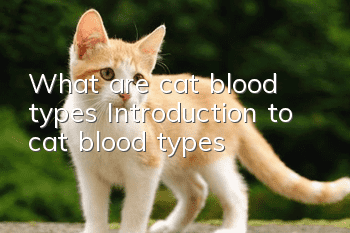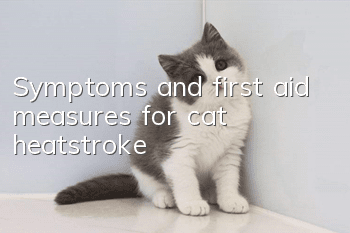What are cat blood types? Introduction to cat blood types

What are the blood types of cats? There are three different blood types in cats: type A, type B and type AB. Many people must not know this. Let’s take a look at the related content of cat blood types.
Cat type A is very common. It can be said that most of the cats around us have type A blood. It is said that more than 90% of cats in the United States have type A blood.
Little secrets about cat blood types:
Among the breeds, 100% of Siamese cats have type A blood. Among Himalayan cats and Maine Coon cats, type A accounts for 90%; while Turkish Angora cats and Turkish Van cats each have half of type A and type B;< /p>
In contrast, type B is not evenly distributed. It is common in some breeds and rare in others. Abyssinian cats, Sphynx cats, German curly cats and Cornish curly cats are more common.
Type AB is a rare blood type no matter which breed it is, and it is only distributed in breeds with type B. So in life, even in the treatment of cats that require blood transfusions, the issue of blood type is not so obvious, unless your cat's blood type is very rare.
What determines a cat’s blood type?
The blood type of humans is determined by genes, and the same is true for cats. In cats, the gene that controls blood type A is dominant, while the gene that controls blood type B is recessive, which means that only homozygotes—that is, both blood type genes are B blood type genes. Only if an individual is an individual, its blood type will be type B, and if this cat has offspring, it can only pass one B blood type gene to its son or daughter.
Cats with type A blood are different. They may have two blood type A genes (technically called homozygotes), but they may also have one blood type A gene and one blood type B gene. Blood type gene (technically called heterozygous).
If this cat is heterozygous, then half of its offspring will inherit the gene for blood type A, and the other half will inherit the gene for type B blood. So if a homozygous cat with type A blood finds a partner with type B blood, their offspring will definitely have type A blood. As for AB blood type, this is a special case, and the genes controlling it are inherited independently.
The current hypothesis is that the AB blood type gene is dominant to the B blood type gene and recessive to the A blood type gene. In short, there are too few cats with AB blood type. In a 1996 American study, among 9,239 cats tested for blood type, only 13 were AB type, accounting for only 0.14%.
Don’t make mistakes when giving a cat a blood transfusion!
Cats, like humans, also have natural antibodies in their bodies, so cat blood types are similar to human blood types. Type A blood is like human type O and has low antibody efficacy in the body; blood type B is like human type A and has antibodies in the body; blood type AB is like human type AB and has no antibodies in the body.
Therefore, blood type identification and cross-matching tests must be performed before cat transfusion to avoid transfusion reactions. Blood transfusion therapy is the best way to treat anemia caused by various causes. Its clinical application has also received more and more attention. In foreign countries, identifying cat blood types has become a routine diagnosis.
Cats with type B blood contain anti-A antibodies in their blood, and the number of antibodies in kittens that are only a few months old has reached a very high level. If you encounter a kitten with type A antigen of red blood cells will undergo agglutination reaction, leading to hemolysis.
However, this usually does not happen because cats with type B blood do not have any type A red blood cells in their bodies. However, just like when a person receives a blood transfusion, if a cat with type B blood is transfused with type A blood, it may be life-threatening.
In addition to blood, antibodies are also present in the colostrum and milk secreted by female cats. Therefore, if a newborn kitten with type A blood drinks the milk of a female cat with type B blood on the first day of birth, , the kitten may absorb a large amount of anti-A antibodies, thereby destroying the original type A red blood cells in its body - this is the legendary "neonatal homohemolytic disease", also known as "neonatal homoimmunity" Hemolytic anemia".
Therefore, in addition to not having the wrong blood transfusion, you also cannot eat the wrong milk. Within 48 hours after birth, newborn kittens can absorb the antibodies in the colostrum through the small intestine.
If two cats with different blood types are mated and the blood type of the resulting kitten is different from that of the mother cat, kitten neonatal erythrolysis (FNI) may occur after the kitten absorbs colostrum. In severe cases, a litter of kittens may die within a week.
Therefore, it is also necessary to conduct blood type identification before mating, especially for breeds with more type B cats. Among cats with type A blood, about 1/3 are born with anti-B antibodies, which will cause agglutination with red blood cells carrying type B antigens. But in most cases, the levels of B antibodies are low—enough to cause severe hemolytic transfusion reactions, but not enough to cause homologous hemolysis in newborn animals.
Does a cat’s blood type determine its personality?
For cats, blood type affects sexWhether personality has an impact, Dudu can only say here that there is currently no scientific research to draw conclusions. If you want to judge the personality of your cat through its blood type, conservatively speaking, there is nothing wrong with doing it as a game.
- Can feeding a cat birth control pills prevent estrus?
- What does a cat’s physical examination check? How much does a pet cat physical examination cost?
- Can cats also get diabetes? Diagnosis and treatment of feline diabetes!
- How to treat nasal branch in cats?
- How should I care for a newborn kitten I found?
- What foods should Turkish Vancordis cats avoid?
- What should I do if my cat is too obese? How to lose weight if your cat is overweight?
- At what age should kittens be dewormed?
- The cat can't breathe and keeps panting. What's going on?
- How to choose a brand of cat food for kittens? Which brand of cat food is good for kittens?



